Lucas Hosseini
The Faiss library
Jan 16, 2024


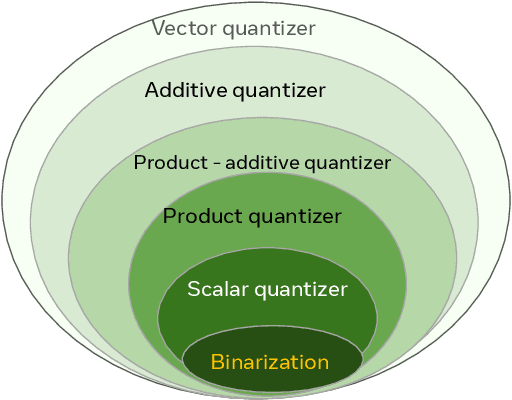
Abstract:Vector databases manage large collections of embedding vectors. As AI applications are growing rapidly, so are the number of embeddings that need to be stored and indexed. The Faiss library is dedicated to vector similarity search, a core functionality of vector databases. Faiss is a toolkit of indexing methods and related primitives used to search, cluster, compress and transform vectors. This paper first describes the tradeoff space of vector search, then the design principles of Faiss in terms of structure, approach to optimization and interfacing. We benchmark key features of the library and discuss a few selected applications to highlight its broad applicability.
Few-shot Learning with Retrieval Augmented Language Models
Aug 08, 2022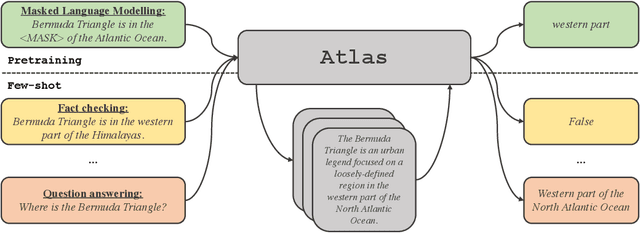



Abstract:Large language models have shown impressive few-shot results on a wide range of tasks. However, when knowledge is key for such results, as is the case for tasks such as question answering and fact checking, massive parameter counts to store knowledge seem to be needed. Retrieval augmented models are known to excel at knowledge intensive tasks without the need for as many parameters, but it is unclear whether they work in few-shot settings. In this work we present Atlas, a carefully designed and pre-trained retrieval augmented language model able to learn knowledge intensive tasks with very few training examples. We perform evaluations on a wide range of tasks, including MMLU, KILT and NaturalQuestions, and study the impact of the content of the document index, showing that it can easily be updated. Notably, Atlas reaches over 42% accuracy on Natural Questions using only 64 examples, outperforming a 540B parameters model by 3% despite having 50x fewer parameters.
Improving Wikipedia Verifiability with AI
Jul 08, 2022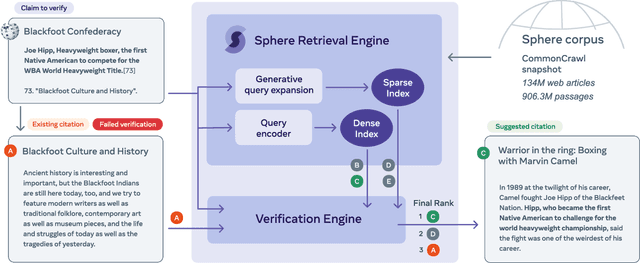

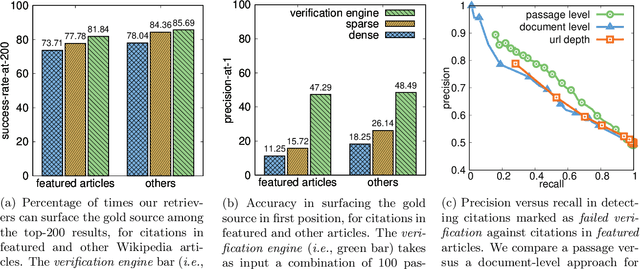
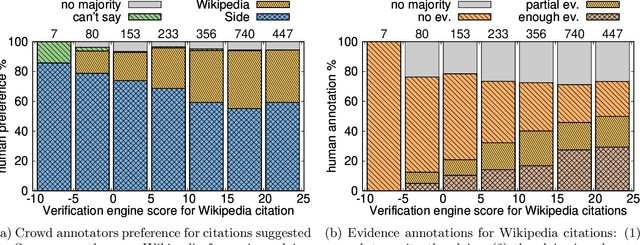
Abstract:Verifiability is a core content policy of Wikipedia: claims that are likely to be challenged need to be backed by citations. There are millions of articles available online and thousands of new articles are released each month. For this reason, finding relevant sources is a difficult task: many claims do not have any references that support them. Furthermore, even existing citations might not support a given claim or become obsolete once the original source is updated or deleted. Hence, maintaining and improving the quality of Wikipedia references is an important challenge and there is a pressing need for better tools to assist humans in this effort. Here, we show that the process of improving references can be tackled with the help of artificial intelligence (AI). We develop a neural network based system, called Side, to identify Wikipedia citations that are unlikely to support their claims, and subsequently recommend better ones from the web. We train this model on existing Wikipedia references, therefore learning from the contributions and combined wisdom of thousands of Wikipedia editors. Using crowd-sourcing, we observe that for the top 10% most likely citations to be tagged as unverifiable by our system, humans prefer our system's suggested alternatives compared to the originally cited reference 70% of the time. To validate the applicability of our system, we built a demo to engage with the English-speaking Wikipedia community and find that Side's first citation recommendation collects over 60% more preferences than existing Wikipedia citations for the same top 10% most likely unverifiable claims according to Side. Our results indicate that an AI-based system could be used, in tandem with humans, to improve the verifiability of Wikipedia. More generally, we hope that our work can be used to assist fact checking efforts and increase the general trustworthiness of information online.
Results of the NeurIPS'21 Challenge on Billion-Scale Approximate Nearest Neighbor Search
May 08, 2022
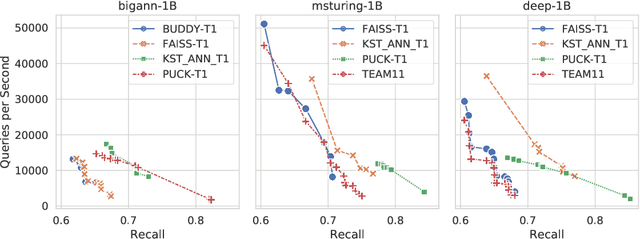

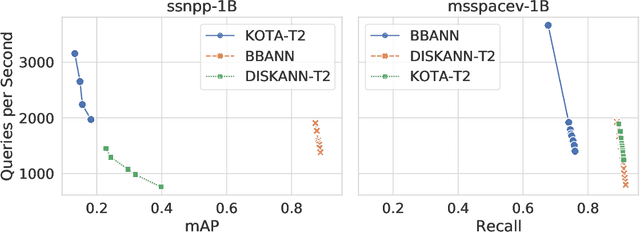
Abstract:Despite the broad range of algorithms for Approximate Nearest Neighbor Search, most empirical evaluations of algorithms have focused on smaller datasets, typically of 1 million points~\citep{Benchmark}. However, deploying recent advances in embedding based techniques for search, recommendation and ranking at scale require ANNS indices at billion, trillion or larger scale. Barring a few recent papers, there is limited consensus on which algorithms are effective at this scale vis-\`a-vis their hardware cost. This competition compares ANNS algorithms at billion-scale by hardware cost, accuracy and performance. We set up an open source evaluation framework and leaderboards for both standardized and specialized hardware. The competition involves three tracks. The standard hardware track T1 evaluates algorithms on an Azure VM with limited DRAM, often the bottleneck in serving billion-scale indices, where the embedding data can be hundreds of GigaBytes in size. It uses FAISS~\citep{Faiss17} as the baseline. The standard hardware track T2 additional allows inexpensive SSDs in addition to the limited DRAM and uses DiskANN~\citep{DiskANN19} as the baseline. The specialized hardware track T3 allows any hardware configuration, and again uses FAISS as the baseline. We compiled six diverse billion-scale datasets, four newly released for this competition, that span a variety of modalities, data types, dimensions, deep learning models, distance functions and sources. The outcome of the competition was ranked leaderboards of algorithms in each track based on recall at a query throughput threshold. Additionally, for track T3, separate leaderboards were created based on recall as well as cost-normalized and power-normalized query throughput.
Towards Unsupervised Dense Information Retrieval with Contrastive Learning
Dec 16, 2021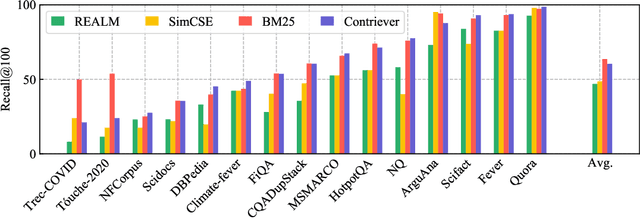

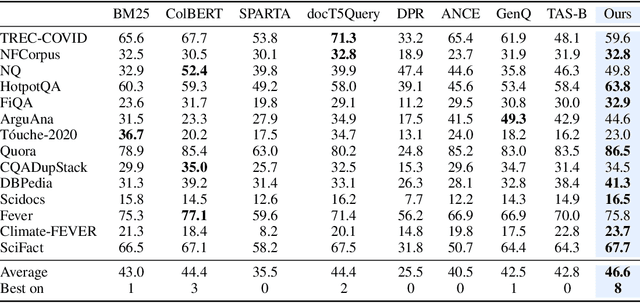
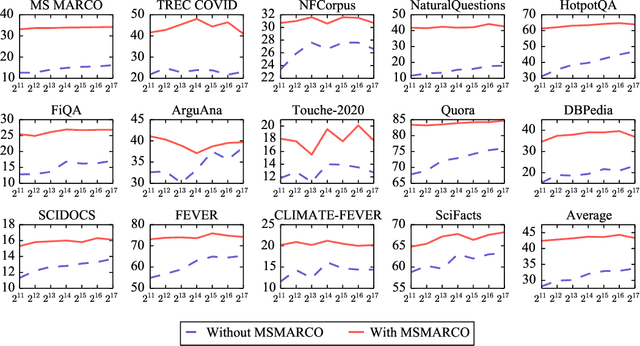
Abstract:Information retrieval is an important component in natural language processing, for knowledge intensive tasks such as question answering and fact checking. Recently, information retrieval has seen the emergence of dense retrievers, based on neural networks, as an alternative to classical sparse methods based on term-frequency. These models have obtained state-of-the-art results on datasets and tasks where large training sets are available. However, they do not transfer well to new domains or applications with no training data, and are often outperformed by term-frequency methods such as BM25 which are not supervised. Thus, a natural question is whether it is possible to train dense retrievers without supervision. In this work, we explore the limits of contrastive learning as a way to train unsupervised dense retrievers, and show that it leads to strong retrieval performance. More precisely, we show on the BEIR benchmark that our model outperforms BM25 on 11 out of 15 datasets. Furthermore, when a few thousands examples are available, we show that fine-tuning our model on these leads to strong improvements compared to BM25. Finally, when used as pre-training before fine-tuning on the MS-MARCO dataset, our technique obtains state-of-the-art results on the BEIR benchmark.
NeurIPS 2020 EfficientQA Competition: Systems, Analyses and Lessons Learned
Jan 01, 2021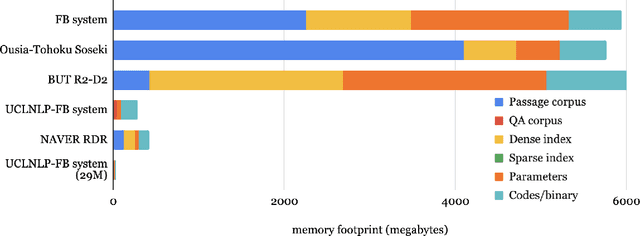
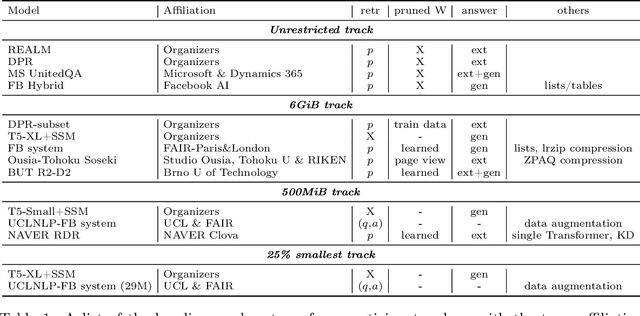
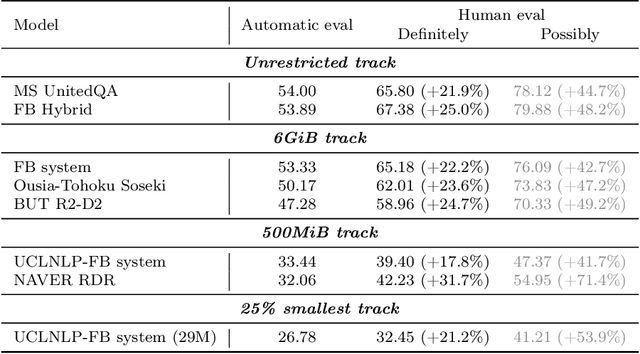
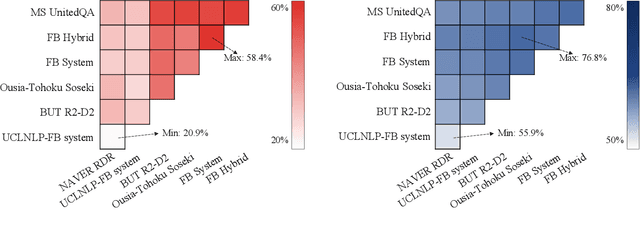
Abstract:We review the EfficientQA competition from NeurIPS 2020. The competition focused on open-domain question answering (QA), where systems take natural language questions as input and return natural language answers. The aim of the competition was to build systems that can predict correct answers while also satisfying strict on-disk memory budgets. These memory budgets were designed to encourage contestants to explore the trade-off between storing large, redundant, retrieval corpora or the parameters of large learned models. In this report, we describe the motivation and organization of the competition, review the best submissions, and analyze system predictions to inform a discussion of evaluation for open-domain QA.
A Memory Efficient Baseline for Open Domain Question Answering
Dec 30, 2020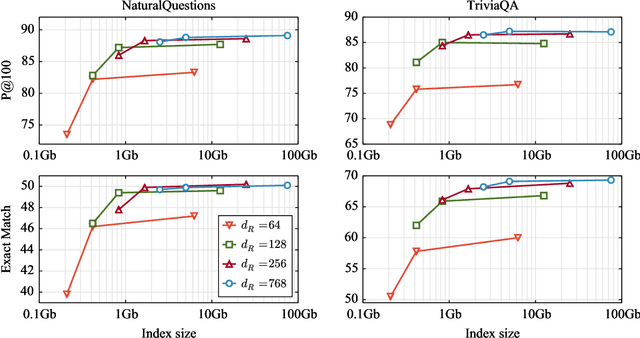
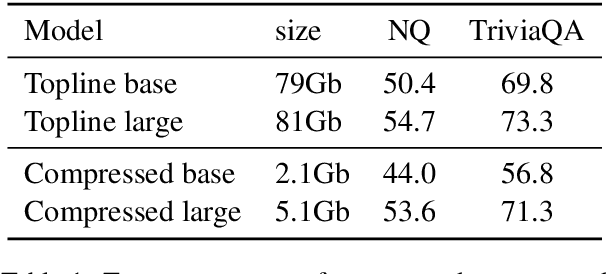
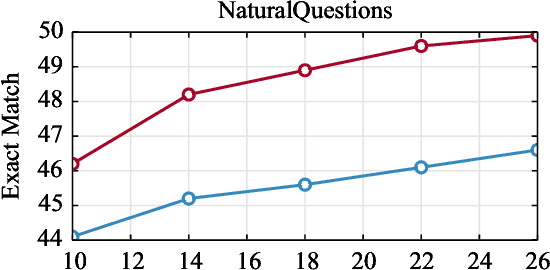
Abstract:Recently, retrieval systems based on dense representations have led to important improvements in open-domain question answering, and related tasks. While very effective, this approach is also memory intensive, as the dense vectors for the whole knowledge source need to be kept in memory. In this paper, we study how the memory footprint of dense retriever-reader systems can be reduced. We consider three strategies to reduce the index size: dimension reduction, vector quantization and passage filtering. We evaluate our approach on two question answering benchmarks: TriviaQA and NaturalQuestions, showing that it is possible to get competitive systems using less than 6Gb of memory.
 Add to Chrome
Add to Chrome Add to Firefox
Add to Firefox Add to Edge
Add to Edge